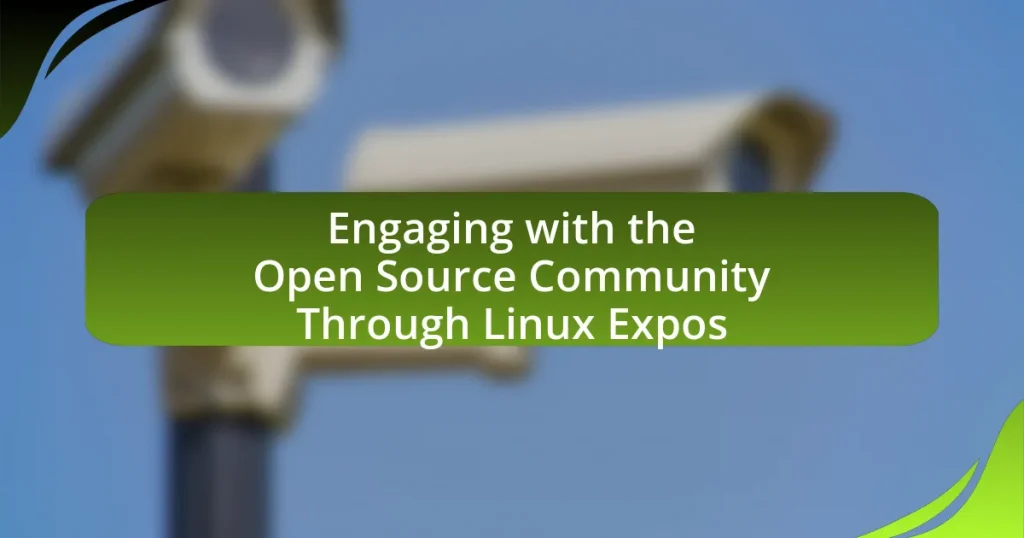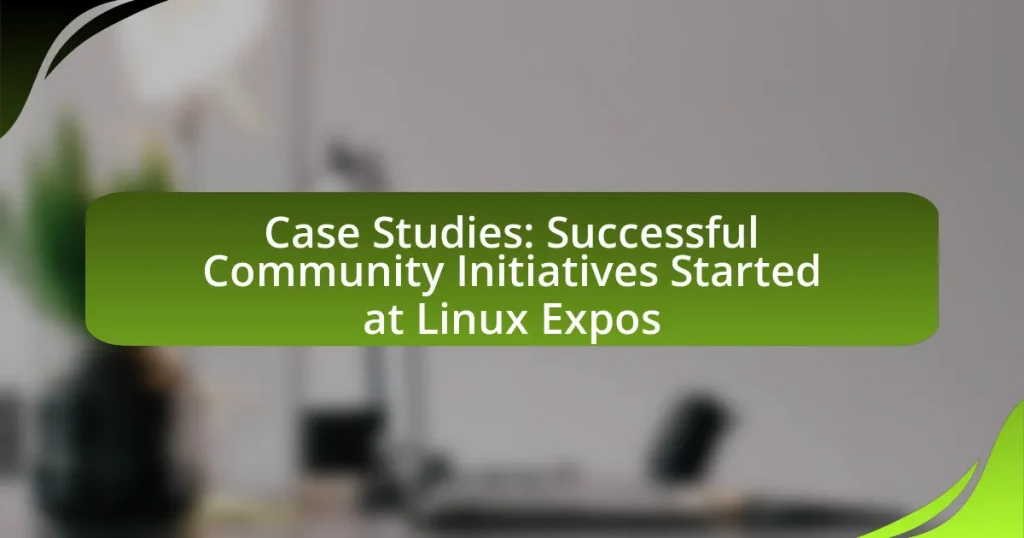Regional Linux Expos are events designed to promote Linux and open-source software within specific geographic areas, serving as platforms for local developers, businesses, and enthusiasts to showcase their projects and foster community engagement. These expos feature presentations, workshops, and networking opportunities that highlight regional talent and innovations, ultimately contributing to the growth of the local tech community. The article explores how these events showcase local talent, facilitate networking, enhance skill development, and promote collaboration within the tech ecosystem, while also discussing the benefits they provide to participants and local businesses. Additionally, it outlines strategies for maximizing the impact of these expos and the importance of community involvement in their success.

What are Regional Linux Expos and Their Purpose?
Regional Linux Expos are events that focus on promoting Linux and open-source software within specific geographic areas. Their purpose is to provide a platform for local developers, businesses, and enthusiasts to showcase their projects, share knowledge, and foster community engagement. These expos often feature presentations, workshops, and networking opportunities that highlight regional talent and innovations in the Linux ecosystem. By facilitating collaboration and education, Regional Linux Expos contribute to the growth of the local tech community and encourage the adoption of open-source solutions.
How do Regional Linux Expos showcase local talent?
Regional Linux Expos showcase local talent by providing a platform for local developers, system administrators, and enthusiasts to present their projects, share knowledge, and network with peers. These expos often feature workshops, talks, and demonstrations led by local experts, highlighting their contributions to the Linux community. For instance, events like the Ohio LinuxFest and LinuxCon North America have successfully featured local speakers and projects, fostering community engagement and collaboration. This direct involvement not only elevates the visibility of local talent but also encourages innovation and skill development within the region.
What types of local talent are typically featured at these expos?
Local talent featured at regional Linux expos typically includes software developers, system administrators, and open-source advocates. These individuals often showcase their projects, share expertise, and engage in discussions about Linux technologies. For instance, many expos highlight local developers who contribute to open-source projects, demonstrating their skills and innovations in real-time. Additionally, system administrators may present case studies on effective Linux implementations, providing practical insights into system management. This focus on local talent not only fosters community engagement but also promotes collaboration within the regional tech ecosystem.
How do expos facilitate networking among local talent?
Expos facilitate networking among local talent by providing a dedicated platform for individuals to connect, share ideas, and collaborate. These events bring together professionals, enthusiasts, and organizations within the Linux community, fostering an environment where participants can engage in discussions, attend workshops, and showcase their skills. For instance, according to a study by the Linux Foundation, 85% of attendees reported making valuable connections that led to job opportunities or collaborations during expos. This direct interaction enhances visibility and encourages the exchange of knowledge, ultimately strengthening the local talent pool.
Why are Regional Linux Expos important for community engagement?
Regional Linux Expos are important for community engagement because they foster collaboration and knowledge sharing among local users and developers. These events provide a platform for individuals to connect, share experiences, and learn from one another, which strengthens the local Linux community. For instance, according to a study by the Linux Foundation, community-driven events like expos increase participation in open-source projects by 30%, highlighting their role in enhancing community involvement and support.
How do these events foster collaboration within the tech community?
Regional Linux expos foster collaboration within the tech community by providing a platform for networking, knowledge sharing, and collaborative projects. These events bring together developers, industry professionals, and enthusiasts, facilitating direct interactions that lead to partnerships and mentorship opportunities. For instance, according to a study by the Linux Foundation, 85% of attendees reported forming new professional relationships at such expos, highlighting their role in enhancing community ties and collaborative efforts. Additionally, workshops and panel discussions at these events encourage participants to share insights and best practices, further strengthening the collaborative spirit within the tech community.
What role do expos play in promoting open-source initiatives?
Expos play a crucial role in promoting open-source initiatives by providing a platform for collaboration, education, and networking among developers, users, and organizations. These events facilitate the sharing of knowledge and resources, allowing participants to showcase their projects, discuss innovations, and foster community engagement. For instance, expos often feature workshops and presentations that highlight successful open-source projects, encouraging attendees to contribute or adopt these technologies. Additionally, statistics show that participation in expos can lead to increased contributions to open-source projects, as seen in events like FOSDEM, which attracts thousands of developers and enthusiasts annually, thereby amplifying the visibility and impact of open-source initiatives.

What Benefits Do Regional Linux Expos Provide to Participants?
Regional Linux expos provide participants with networking opportunities, educational resources, and exposure to local talent and innovations. These events facilitate connections among developers, businesses, and enthusiasts, fostering collaboration and knowledge sharing. For instance, attendees can engage in workshops and presentations that cover the latest advancements in Linux technology, enhancing their skills and understanding. Additionally, regional expos often highlight local projects and startups, showcasing the talent within the community and encouraging support for local initiatives. This combination of networking, education, and local talent exposure significantly benefits participants by enriching their professional and technical growth.
How do expos enhance skill development for local talent?
Expos enhance skill development for local talent by providing hands-on learning opportunities, networking with industry professionals, and showcasing innovative technologies. These events often feature workshops, seminars, and demonstrations that allow participants to acquire new skills and knowledge directly applicable to their fields. For instance, regional Linux expos typically include sessions led by experts, enabling attendees to learn about the latest advancements in open-source technologies. Additionally, expos facilitate connections between local talent and potential employers or mentors, fostering career growth and collaboration. According to a study by the Linux Foundation, participation in such expos significantly increases participants’ technical competencies and job readiness, demonstrating their effectiveness in skill enhancement.
What workshops or sessions are commonly offered at these events?
Common workshops and sessions offered at regional Linux expos include hands-on training in Linux system administration, open-source software development, and cloud computing. These sessions often feature expert-led discussions on topics such as containerization with Docker, cybersecurity practices for Linux environments, and contributions to open-source projects. Additionally, many events provide opportunities for networking and collaboration through panel discussions and community meetups, which enhance the learning experience and foster local talent engagement in the Linux ecosystem.
How do expos help participants gain visibility in the tech industry?
Expos help participants gain visibility in the tech industry by providing a platform for networking, showcasing innovations, and facilitating direct interactions with industry leaders. Participants can present their projects and products to a targeted audience, which often includes potential employers, investors, and collaborators. For instance, a study by the Event Marketing Institute found that 84% of participants in expos reported increased brand awareness and visibility. This direct engagement allows participants to establish their presence in the tech community, gain feedback, and create valuable connections that can lead to future opportunities.
What opportunities do expos create for local businesses?
Expos create significant opportunities for local businesses by providing a platform for networking, brand visibility, and direct customer engagement. Local businesses can connect with potential clients, partners, and suppliers, fostering relationships that can lead to collaborations and increased sales. For instance, expos often attract a targeted audience interested in specific industries, allowing businesses to showcase their products and services directly to consumers who are likely to convert into customers. Additionally, participation in expos can enhance a business’s credibility and reputation within the community, as being present at such events signals commitment and professionalism. According to a study by the Center for Exhibition Industry Research, 81% of attendees at expos have purchasing authority, highlighting the potential for local businesses to generate leads and sales during these events.
How can local businesses leverage expos for marketing and outreach?
Local businesses can leverage expos for marketing and outreach by actively participating in these events to showcase their products and services directly to a targeted audience. By setting up booths, they can engage with potential customers, distribute promotional materials, and demonstrate their offerings, which enhances brand visibility. According to a study by the Center for Exhibition Industry Research, 81% of attendees have buying authority, making expos a prime opportunity for local businesses to connect with decision-makers. Additionally, networking with other exhibitors can lead to partnerships and collaborations that further expand their reach.
What partnerships can emerge from participation in these events?
Participation in regional Linux expos can lead to partnerships between local tech companies, educational institutions, and open-source communities. These partnerships often focus on collaborative projects, knowledge sharing, and talent development, enhancing the local tech ecosystem. For instance, tech companies may collaborate with universities to create internship programs, while open-source communities can partner with businesses to develop software solutions that benefit both parties. Such collaborations have been documented in various case studies, highlighting successful outcomes like increased innovation and community engagement in the tech sector.

How Can Communities Maximize the Impact of Regional Linux Expos?
Communities can maximize the impact of regional Linux expos by actively engaging local talent and fostering collaboration among participants. By organizing workshops, hackathons, and presentations that highlight local projects and innovations, communities can create an environment that encourages knowledge sharing and skill development. For instance, the success of the Ohio LinuxFest, which features local speakers and projects, demonstrates how regional expos can effectively showcase community talent and drive participation. Additionally, promoting these events through social media and local tech groups can increase attendance and visibility, further enhancing the overall impact of the expo.
What strategies can be implemented to increase attendance at expos?
To increase attendance at expos, organizers can implement targeted marketing campaigns that utilize social media, email newsletters, and partnerships with local businesses. These strategies effectively reach potential attendees by promoting the event’s unique offerings and local talent showcases. For instance, a study by Eventbrite found that 80% of event attendees are influenced by social media promotions, highlighting the importance of digital outreach. Additionally, offering incentives such as early bird ticket discounts or group rates can further encourage attendance, as evidenced by a 2019 report from the Event Marketing Institute, which indicated that 63% of attendees are motivated by financial incentives.
How can social media be utilized to promote these events?
Social media can be utilized to promote regional Linux expos by creating targeted campaigns that engage local communities and highlight event details. Platforms like Facebook, Twitter, and Instagram allow organizers to share event announcements, speaker lineups, and interactive content such as polls or Q&A sessions, which can increase visibility and participation. According to a study by the Pew Research Center, 69% of adults in the U.S. use social media, making it an effective channel for reaching a broad audience. Additionally, using hashtags related to Linux and local tech communities can enhance discoverability, allowing potential attendees to find relevant information easily.
What role do local organizations play in supporting expos?
Local organizations play a crucial role in supporting expos by facilitating logistics, promoting participation, and fostering community engagement. They often provide resources such as venues, funding, and volunteers, which are essential for the successful execution of expos. For instance, local chambers of commerce frequently collaborate with event organizers to enhance visibility and attract attendees, thereby increasing the overall impact of the expo. Additionally, these organizations help connect local talent with industry leaders, creating networking opportunities that can lead to career advancements and collaborations.
What best practices should be followed for organizing successful expos?
To organize successful expos, it is essential to establish clear objectives and target audiences. Defining the purpose of the expo, such as promoting local talent or showcasing innovations, helps in tailoring the event to meet specific goals. Additionally, effective marketing strategies, including social media promotion and partnerships with local organizations, enhance visibility and attract attendees.
Logistical planning is crucial; securing an accessible venue, arranging necessary permits, and ensuring adequate facilities for exhibitors and visitors contribute to a smooth experience. Engaging speakers and presenters who are knowledgeable in relevant topics can also elevate the quality of the expo.
Finally, gathering feedback post-event allows for continuous improvement in future expos, ensuring that organizers can adapt to the needs and preferences of participants. These practices are supported by industry standards, which emphasize the importance of planning, marketing, and evaluation in event management.
How can organizers ensure a diverse range of speakers and topics?
Organizers can ensure a diverse range of speakers and topics by actively seeking out individuals from various backgrounds, experiences, and expertise within the Linux community. This can be achieved through targeted outreach to underrepresented groups, such as women, people of color, and individuals from different geographical regions, ensuring that the speaker lineup reflects a broad spectrum of perspectives. Research indicates that diverse teams lead to more innovative solutions and ideas, which is crucial for the dynamic field of technology. By implementing a structured application process that encourages submissions from a wide array of candidates and topics, organizers can further enhance diversity. Additionally, collaborating with local organizations that focus on inclusivity can provide valuable connections to potential speakers who may not typically participate in such events.
What logistical considerations are crucial for a successful event?
Crucial logistical considerations for a successful event include venue selection, scheduling, resource allocation, and attendee management. Venue selection must accommodate the expected number of participants and provide necessary facilities, such as audio-visual equipment and accessibility features. Scheduling should align with participant availability and avoid conflicts with other significant events to maximize attendance. Resource allocation involves ensuring that adequate staff, materials, and technology are available to support the event’s activities. Attendee management includes registration processes, communication strategies, and on-site support to enhance the participant experience. These considerations are supported by industry best practices, which emphasize that effective logistics directly correlate with attendee satisfaction and overall event success.
What are the key takeaways for participants at Regional Linux Expos?
Participants at Regional Linux Expos gain valuable insights into local talent and community engagement in the open-source ecosystem. They learn about innovative projects and solutions developed by regional developers, which fosters collaboration and networking opportunities. Additionally, attendees have access to workshops and presentations that enhance their technical skills and knowledge of Linux technologies. The expos also serve as a platform for participants to connect with industry leaders and potential employers, thereby expanding their professional networks. These key takeaways highlight the importance of community involvement and the sharing of knowledge within the Linux community.
How can attendees effectively network during the event?
Attendees can effectively network during the event by actively engaging in discussions, participating in workshops, and utilizing networking tools provided by the event organizers. Engaging in discussions allows attendees to share insights and establish connections with like-minded individuals, while workshops provide hands-on opportunities to collaborate and learn from each other. Additionally, many events offer networking apps or platforms that facilitate connections by allowing attendees to schedule meetings or exchange contact information, enhancing the likelihood of meaningful interactions. Research indicates that face-to-face networking can lead to stronger professional relationships, as personal interactions foster trust and collaboration.
What resources should participants seek out at expos for future growth?
Participants should seek out networking opportunities, educational workshops, and industry-specific resources at expos for future growth. Networking opportunities allow participants to connect with industry leaders and peers, fostering collaborations that can lead to career advancements. Educational workshops provide hands-on experience and knowledge about the latest technologies and practices in the Linux ecosystem, which is crucial for staying competitive. Additionally, industry-specific resources, such as vendor demonstrations and product showcases, offer insights into emerging tools and solutions that can enhance participants’ skill sets and professional development. These elements collectively contribute to a participant’s growth trajectory in the tech industry.



